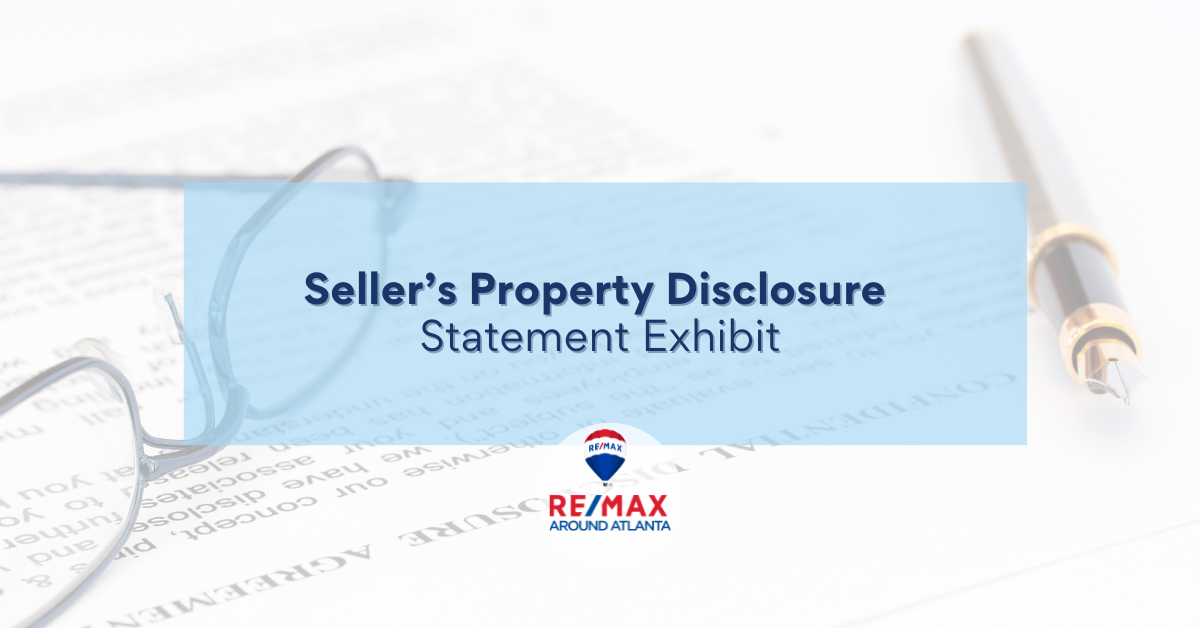|
RE/MAX Around Atlanta encourages all sellers to complete the GAR Seller’s Property Disclosure Statement Exhibit (SPD) to avoid any disclosure issues. If the seller has not occupied the property, the Seller should complete the Seller’s Disclosure of Latent Defect(s) Exhibit. To avoid broker liability, t is imperative that the sellers themselves complete the exhibit. The broker or agent should never complete the exhibit for the seller. In Georgia, a buyer cannot make a claim against the seller’s broker for false statements that were made by the seller in the seller’s disclosure statement - unless the seller’s broker knows the representations to be false. Neither can the buyer sue the seller’s agent for fraud when the seller fails to disclose concealed defects in the property.
Seller’s Agreement in the SPD The SPD includes directions on how sellers should fill out the statement and how buyers should use the exhibit. In completing the disclosure statement, the seller agrees to do the following: (1) answer all questions in reference to the property (which, unless noted, shall include any improvements); (2) leave no questions unanswered; (if the sellers cannot answer, they should use the additional explanations section to explain) (3) answer all questions fully and accurately based upon the best knowledge and belief of all sellers in the purchase and sale agreement. (All sellers must sign the SPD) (4) fully explain in the “additional explanations” paragraph any questions to which the answer is “yes,” referencing the number of the question for which the additional explanation is being given; and (5) promptly revise the statement and provide a copy of the same to the buyer and any broker involved in the transaction if, before closing, there are any material changes in the answers to any of the questions. How Buyers Should Use the SPD Buyers are advised that the disclosure statements should be the starting point for a buyer’s investigation rather than the entire investigation. Caveat emptor or buyer beware is still the law in Georgia. Therefore, if an inspection reveals an issue or concern that would cause a reasonable buyer to investigate further, the buyer will likely be out of luck if the buyer chooses not to do so. The disclosure statement language to buyers is as follows: The answers of Seller below should not be a substitute for Buyer conducting a careful, independent evaluation of the Property. Caveat emptor or buyer beware is the law in Georgia. Buyers are expected to use reasonable care to identify defects in the Property and satisfy themselves that the Property is suitable for Buyer’s needs and purposes. If an independent evaluation of the Property reveals potential problems or areas of concern that would cause a reasonable buyer to investigate further, Buyer may not have legal recourse if Buyer fails to investigate further. GAR has created substantially similar property disclosures for Condominiums (GAR Form F304), for New Construction (GAR Form F310), for Lots and Land (GAR Form F307) that are tailored to those situations. The Seller Property Disclosures Must Be Attached to the Purchase and Sale Agreement. The “Entire Agreement” Clause The Seller Property Disclosure must be attached to the Purchase and Sale Agreement for a buyer to be able to bring successful claims against sellers for breach of contract if sellers make material misrepresentations in the property disclosure statements. This is based upon the “entire agreement clause” (also known as a “merger clause”). The entire agreement clause establishes that the final written agreement between the parties represents the entire agreement of the parties and that the parties are only relying on what is written in the contract. Consequently, an entire agreement clause bars a buyer from relying on alleged misrepresentations not contained in the written agreement. Active Concealment of Defects The Georgia Court of Appeals recently held that buyers could successfully sue the sellers for facts falsely stated in the property disclosure statement, even if the statement was not made part of the contract, if the sellers actively concealed the damage. References: Weissman, Seth. The Red Book on Real Estate Contracts in Georgia (pp. 755-763). BookBaby. Kindle Edition. Seller’s Property Disclosure Statement Exhibit GAR F301 Broker Corner May 10, 2023
0 Comments
Leave a Reply. |
RMAAReal Estate News, Brokers Blog & More Categories
All
Archives
July 2024
|


 RSS Feed
RSS Feed